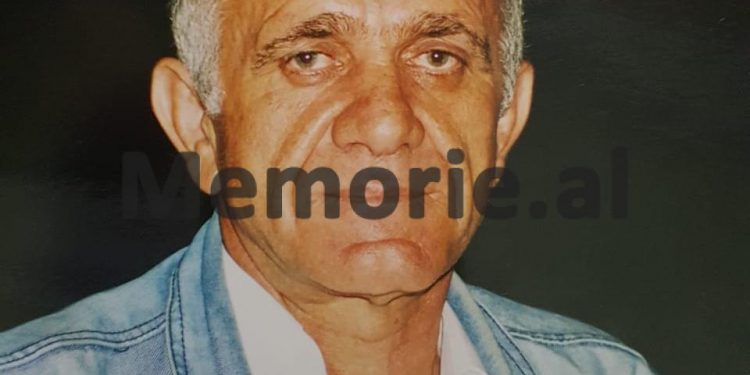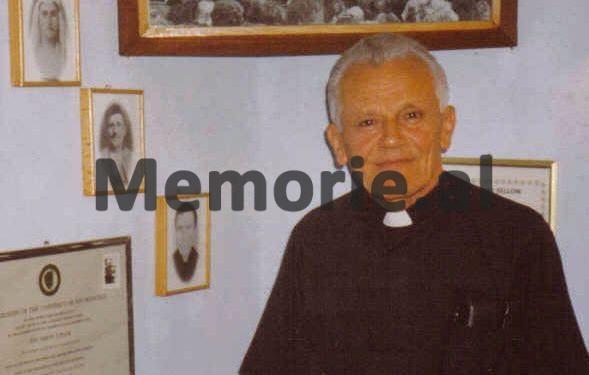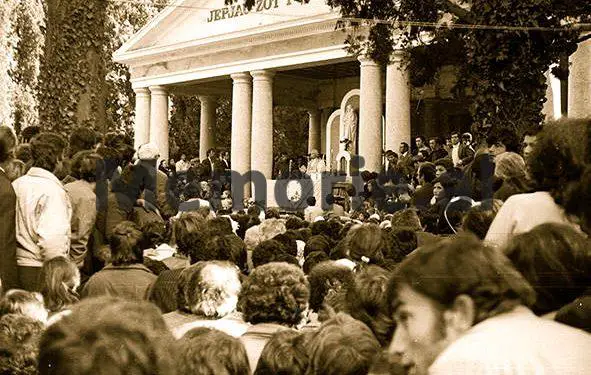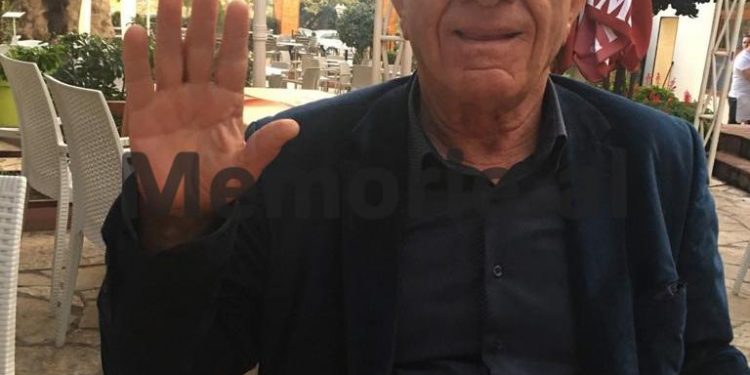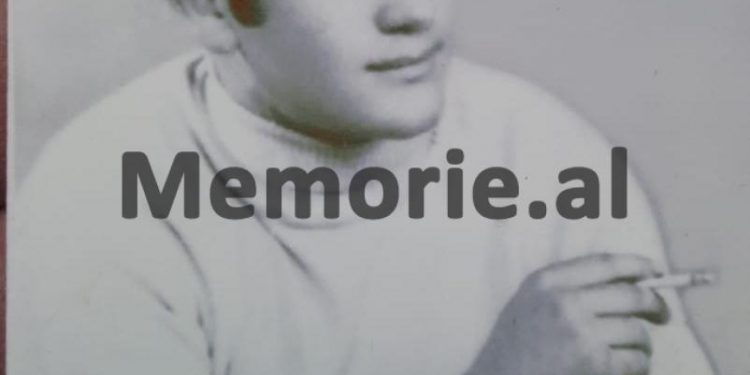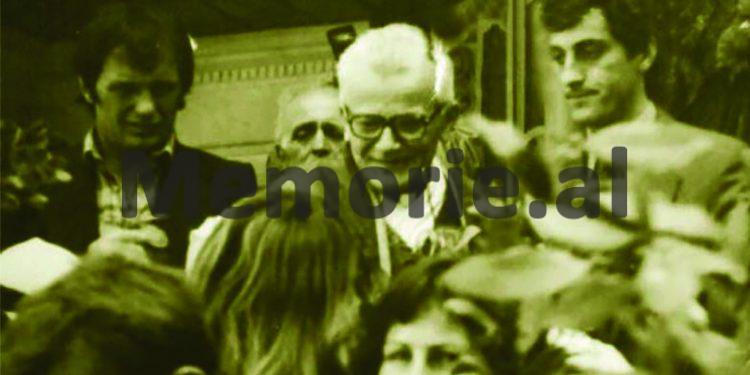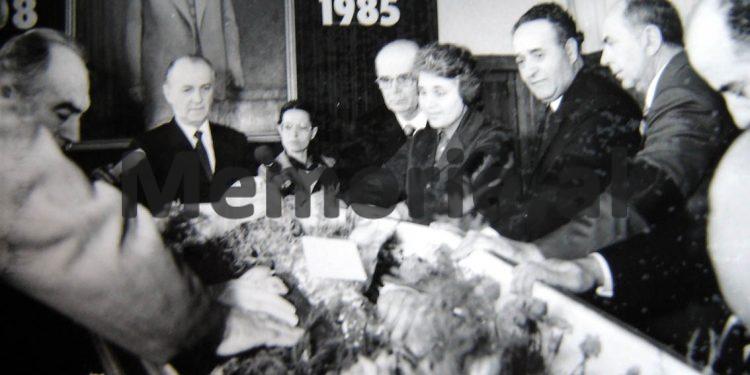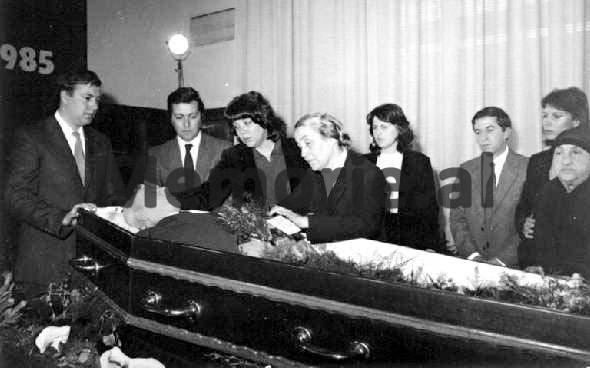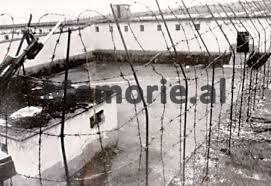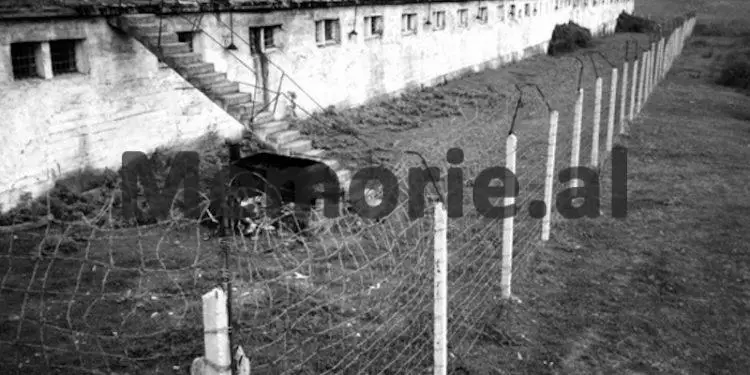Dashnor Kaloçi
Memorie.al publishes the unknown story that took place on April 11, 1985 in Burrel prison, where some of the political prisoners who were considered dissidents or the strongest opponents of Enver Hoxha’s communist regime were serving long sentences. The rare testimonies of former political prisoners, Qani Sadiku (originally from the village of Markat in Saranda), one of the symbols of anti-communist resistance, who has suffered for 20 years in the camps and prisons of that regime, in connection with the news of the former’s departure to the dictator Enver Hoxha, how did they first learn, what happened that day in that prison, and why did Dom Simon Jubani not rejoice like the others after receiving that news ?!
In the spring of 2006, while we were working on a TV documentary about the crackdown and the brutal war waged by the communist regime of Enver Hoxha on religious religions in Albania and mainly that of the Catholic faith, during the filming and various interviews that We did in the city of Shkodra, we also had the opportunity and luck to meet Dom Simon Jubani, the famous Catholic clergyman, who was considered a symbol of anti-communist resistance in the prisons of the dictatorial regime of Enver Hoxha and who had held the first mass in the Cemetery of Rrmajt, in the November 1990 subdivision. And to conduct a long interview with him, in the house of his brother where he lived at that time, a small one-story apartment with a yard, on the outskirts of Shkodra. After the interview for the documentary in question, (“The evil year 1967, when the Albanians declared war on God”), taking advantage of the opportunity, we asked Dom Simoni about other events, such as how it was received. the death of Enver Hoxha in Burrel prison, etc., with the idea of conducting a long interview in the print media. Although initially, Dom Simoni had barely agreed to talk to him (as we had not only notified him before, but were also bothering him at a time when he was resting), with the intervention of a friend of ours from Shkodra who accompanied us and the people of Dom Simon’s brother’s house as well, he agreed to talk to us about the documentary as well as other stories and events from his life, and beyond. From the limited time we had available, we parted amicably with Dom Simoni, promising to go another day to meet him, of course after informing him in advance, to conclude that long interview with him, for in the print media. Which, unfortunately, we couldn’t do, because after a while Dom Simoni passed away. From the conversations we had with Dom Simoni, among other things, it was very interesting what he told us when we asked him about how Enver Hoxha’s death was expected in Burrel prison, where he was serving his sentence at the time. That conversation left halfway with Dom Simon 15 years ago (today, 35 years after the death of dictator Enver Hoxha), was completed by one of his accomplices, Qani Sadiku, (originally from the market village). of Saranda), which is considered a symbol of anti-communist resistance and has suffered for 20 years in the prisons of the dictatorial regime of Enver Hoxha.
Mr. Sadiku, how did you learn the news of Enver Hoxha’s death in Burrel prison?
Yes, from five-thirty in the morning of April 11, 1985, when the broadcasts of Radio Tirana began and we listened to them through the sound that was in all the cells of that prison, the first suspicions began, as it was not being broadcast as usual music with folk songs, but classical music was being given. This unusual thing caught our attention and one of the accomplices who was there in our cell (no. 7) said loudly: “It seems to me that Haxhi Lleshi has died, he took the evil from us.” These were the first words that were said that morning, but I don’t remember well if he said about Haxhi Lleshi or Pilo Peristeri, I don’t remember exactly which of these names he mentioned, but one of these old leaders, probably and Shefqet Peçi, I don’t remember very well.
Did the discussion then begin with what might have happened and how did you learn the news of Enver’s death?
Immediately, the discussions started that we had that job, how would we spend the day, he did not die, he did not die, but for Enver Hoxha, it never even crossed our minds. Sometime around 10 a.m. on April 11, the door to our cell was opened, and the corridor cleaner, Stavri Guxo, an ally of ours (a very good boy of Greek descent), announced that Enver Hoxha had died. The first to hear that was Dedë Begeja, a boy from Shkodra, who immediately shouted with great joy: “Heeeej, listen, that dung has died, Enver, the dog has died”, and released some other insults. with the most banal vocabulary. Without finishing his speech he, almost all of us who were in that cell, as we were in bed, as with a command, we started shouting and singing, making yrraaaa, etc., exclamations and cheers An extraordinary situation was created. that we had never experienced during all those years we were there, as the convict and less optimistic, there is always hope that he will be released, and that news said a lot.
Where did the convict Stavri learn the news from?
As Stavri later told us, he had learned the news from the State Security officer, Pirro Nuredini (originally from Sevaster, Vlora), who was an Operational Worker in Burrel Prison, who had just arrived. had told the guard officer and the non-commissioned officer who were there on duty what had happened. And Stavri, who in those moments was there cleaning the offices and corridors, like any prisoner with ears ready for such news, had heard and told us.
After you learned the news and started shouting and cursing, what happened next in prison, did you have problems with the prison command ?!
A few minutes after we started shouting and cursing, we could hear footsteps in our hallways and loudly cracking shoes, as well as rowing drills or squares of soldiers in parades crashing hard.
Why was it happening, what was going on there?
The prison command, as soon as it heard the news, but inmates and non-commissioned officers of the prison to pass through the corridors several times and toss their feet loudly and loudly, to put psychological pressure on us, convicts, letting us know. that measures were being taken, and that we should remain calm.
What other measures were taken, that is, apart from the crackling of the steps in the corridors, after the news of Enver’s death was learned, what else changed in the prison regime, from an ordinary day?
Another measure we noticed was the reinforcement of the guards in the guard posts, or carol, as we used to say, where in addition to the usual soldiers guarding the Kalashnikovs, on their necks and ready for the fire, they were added by a non-commissioned officer. with a Kalashnikov and light two-legged machine gun and bullet casings in the nest, ready for the fire.
Where did you see these?
From the cell of our cell a caracol was visible, and from every other cell a watch-guard was seen.
Why were all these measures taken when you were isolated ?!
All of this was done to increase combat readiness, as were the rules of the prison when outrageous events occurred, but more for psychological pressure on us to maintain some revolt.
How do I proceed with the situation in your cell?
Moments after we heard the news and almost everyone started shouting, I approached Dom Simon Juban, the accomplice of our cell after his calmness caught my attention. He didn’t react at all, but he was staying calm as if nothing had happened. Dom Simoni, in addition to being an educated man, well-educated and highly cultured, was authoritarian and a determined anti-communist who, as appreciated and respected by all convicts, was the eye of command for his harsh stance. that held against them. Based on this, I was impressed by his calmness, at a time when that news came to us and I thought that Dom Simoni should “fly” with joy.
What did you talk to him about?
I started teasing him, saying, “Hey Padre, you’re scared, don’t you have a word to say?” I did not say these words to harass him in the bad sense of the word, but to teach him something more than what would happen after that.
What did Dom Simon say to you, and how did he respond?
At the height of his nervousness, taking more than he could handle when he was calm, he addressed me: “Nigjo here, you get the product of ’45. Why are you rejoicing in vain? This criminal has been decimated, and the next criminal who is more likable than him will come, because he is more thirsty for power and nothing will happen to me”.
Why did he tell you “product of ’45” and who was the “other criminal” talking about, Ramiz Alia ?!
Dom Simoni used to call us, who were born after 1945, after the endless debates and discussions that took place in our cells, “the product of the ’45s”, that is, that we had grown up, educated and froze with communist ideology. That’s how he often addressed us, and we didn’t take that badly, and “that other criminal” was talking about Ramiz Alia.
But why was Ramiz Alia considered a criminal just like Enver Hoxha in the conversations and discussions that took place there in Burrel prison ?!
Many considered him a criminal just like Enver, others called him somewhat liberal, so there were different opinions and opinions about him. Dom Simoni, as he was from Shkodra, had known Ramiz since his youth, when he (Ramizi) had been a student at the high school in Shkodra and also knew a lot about him. He also knew from what Fadil Paçrami had told him, who had been a close friend of Ramiz since high school in Shkodra and until the day he was arrested, as well as General Gjin Marku. Based on these, etc., Dom Simoni called Ramiz a criminal, just like Enver.
What else did Dom Simon tell you?
Dom Simoni, at the height of his nerves, continued by telling me: “These people are the same, one of them leaves and the other one comes, nothing has changed, because this other criminal who will come after him, has the same way. and he will do the same. One day I will come to them because I know when, but I will come. Maybe sooner or later things will change, and there will be dozens of hotels like the one in Tirana (I was talking about the 15th floor) and I will be surrounded by dozens of people in Albania, and I will be much better and more beautiful. se ai. But with what this system has been doing for forty years now, it must take at least another 50 years, to change the mentality of these people, who believe in me and apply the norms and rules of a society, without exercise. violence, as does the world of Western society. That we are wise when we look at the policeman, but as we go further, where he does not see us, we act as if we have acted. And this is the biggest problem because it is like the work of the earth, which, although it looks beautiful, does not produce good plants, but bad medicines, because that is how it has its roots ”.
So, Dom Simoni, it seemed unbelievable… ?!
Dom Simoni was skeptical of changing the mentality of these people and strongly believed in the overthrow of that regime which he said had its days numbered, although, for Ramiz, he said he would follow the same path as Enver.
Who else in your cell was from well-known names and how did the further conversations about what happened, ie the death of Enver Hoxha, continue?
Yes we were about 16-17 people, in our cell. I remember that they were: Kurt Kola, Spartak Ngjela, Abdulla Sallaku, Spartak Bedri Spahiu, Bardhosh Bego Gjonzeneli from Vlora, Mario Pistulli from Shkodra, Fatos Kërluku, Nuredin Skrapari, etc. The conversations there were very different and everyone interpreted that event in their way and what would happen next, but almost everyone was of one mind, that after the death of Enver Hoxha, things would change and there was a mitigation of the situation.
But did the command officially inform you of the news of Enver Hoxha’s death, as was done with the enterprises and production centers, schools, etc.?
No nothing, neither that day nor the next day, nothing was communicated to us. We learned what had happened the next day through the newspapers “Zeri I Popullit” and “Bashkimi” that was brought to us every day, putting them in our cells and whoever wanted to read them.
So that news about the death of Enver Hoxha was closed?
Nothing happened other than increased prison readiness on the part of the prison command and the strengthening of the prison service regime. Everything returned to the normality of the usual routine and we continued our conversations and discussions, hoping for a change in the situation and release from prison./Memorie.al




